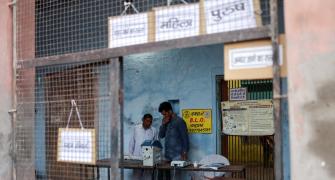The country-wide indefinite strike by truckers, protesting hike in fuel prices and higher levies, entered the sixth day on Saturday amidst fears of crippling production at industrial units even as prices of essential commodities rose alarmingly.
The strike has seen the prices of fruits and vegetables prices go up in the country.
Supplies are feared to be further hit as tempos and small lorries also joined the stir from today in Delhi. The AIMTC has also decided to stage a protest at Jantar Mantar and Azadpur Sabzi Mandi in New Delhi.
"Our president B N Dhumal is slated to reach here and take part in staging the protest march," AIMTC secretary general S K Saksena said on Saturday.
Trade and industry officials said the strike would affect supplies 'very soon.'
According to an estimate, the strike costs businesses Rs 20,000 crore (Rs 200 billion) a day, while truckers are losing Rs 500 crore daily (Rs 5 billion).
The agitating truckers' demands include putting an end to frequent hike in diesel prices, immunity from a planned value-added tax, repeal of an order to scrap 15-year-old trucks and fixing of minimum freight rates.
Sugar bitter: Domestic sugar prices too have been spiralling upwards from the beginning of this month. Today medium sugar ended at Rs 1,275 per quintal while small sugar ended at Rs 1,224 per quintal.
These commodities touched a high in their prices of Rs 1,279.50 and Rs 1,232.50 per quintal.
Sugar prices have been rising throughout the first fortnight of April, mostly on account of the strike that is now become nationwide.
Shiv Sena's MLC (member of legislative council), Kanhaiyalal Gidwani said that this price increase is primarily due to the strike which was causing an artificial shortage.
"Since it is an essential commodity, the government will have to help transport commodities like sugar to the city," he said.
Truckers have been on a strike in Maharashtra since the beginning of April protesting the court's order to fine trucks over 15 years old and have not converted to a more environment friendly CNG.
Starting April 13 these truckers joined a nationwide strike to protest varied excise duties and constant revisions in diesel prices.
Most perishables and essential commodities would have suffered as a result of this strike but the truckers have allowed special vehicles to pass through with essential commodities including fruits, vegetables, oil and fuel.
The state government while reviewing the situation recently said that essential commodities were being transported under police protection.
The transporters federation had assured the government that it would extend assistance in manners possible so that supply of essential commodities would not be affected.
Accordingly, the city has been receiving an average of 1,100 trucks of foodgrains and 600 odd tankers for milk and vegetables.
Though officials have been assuring that the prices of essential commodities will not affected, sugar prices have slowly been rising.
At the end of 2001-02 sugar season, stock levels were at a high of 11 million tonnes, which is an equivalent to 8.2 months of domestic consumption. An ideal stock level would be 3 to 4 months of domestic consumption as it is a cyclical crop.
Production for 2002-03 was expected to be lower by around 8.7 per cent at 16.7 million tonnes as compared to the previous year.
This was supposed to help the industry despite the low yield of sugarcane as this was expected to bring down the inventory levels.
The high inventory levels had pushed prices of sugar to low levels which was causing intense discomfort to the sugar companies and cooperatives.
So a hike in prices, though may be artificial may be a good thing after all. In some cases, there have been instances of hoarding by traders to increase the prices.
"But," said a Mantralaya official, "in the case of sugar, at least within the city, there are enough reserve stocks to go ahead without feeling the pinch."
Towards the end of the trading today, sugar prices at the local markets came off to end the week on a lower note.
Additional inputs: Business Standard







